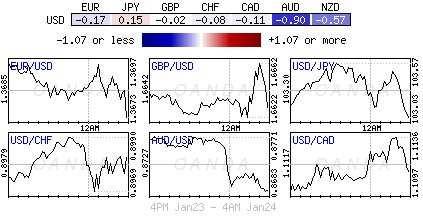A deteriorating Chinese economy is rattling investor confidence. The January flash Markit/HSBC Purchasing Managers’ Index revealed a downturn in China’s manufacturing sector for the first time in six months, falling to 49.6 in January from 50.5 in December. Any reading below 50 indicates contraction. This has managed to spook the foreign exchange (forex) market, allowing risk aversion to weigh upon equity markets and emerging market currencies. In contrast, the Shanghai Composite remains supported by the latest PBoC cash injection. All along, the fixed income asset class had been signaling all was not well for the global economy despite expectations of a Fed taper. Safe-haven flows into core country government bonds remain on the rise, with front-month Bund futures hitting fresh contract highs earlier this morning. The 18-member single currency briefly tested above the 1.37 level ahead of the European session but could not sustain the move. The EUR/JPY cross has managed to temporarily derail the Euro's momentum.
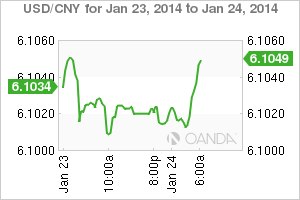 USD/CNY" title="USD/CNY" height="200" width="300">
USD/CNY" title="USD/CNY" height="200" width="300">
The knock-on effect was evident stateside yesterday with U.S. 10-year Treasury yields declining to their lowest level in less than two months (2.78%), while American indices lost -1% or more intraday. Even investors’ fear gauge indicator, the VIX index, managed to surge more than 10%, while the much maligned price of gold rallied more than 1.6% to a one-month high above $1,260. Unsurprisingly, the majority's favorite dollar came under pressure, squeezing the weakest of the dollar longs out of position.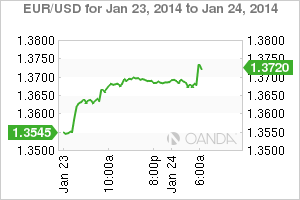 EUR/USD" title="EUR/USD" align="bottom" border="0" height="200" width="300">
EUR/USD" title="EUR/USD" align="bottom" border="0" height="200" width="300">
Revised IMF Forecasts a Mixed Bag
All of this has occurred only one day after the International Monetary Fund (IMF) released its revised global growth forecasts. IMF chief, Christine Lagarde, and her crew raised growth estimates for Japan, Europe, and the U.S., but reduced them for Latin America and Russia. Growth in the developed world is stabilizing, but not so in emerging markets. It seems that the gears of the global economy are shifting, and they are increasingly shifting toward instability in the developing economies.
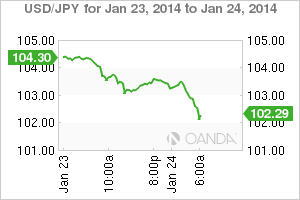 USD/JPY" title="USD/JPY" align="bottom" border="0" height="200" width="300">
USD/JPY" title="USD/JPY" align="bottom" border="0" height="200" width="300">
For the past 18 months, the forex market has been essentially handcuffed by the Group of Seven’s central banks, whose monetary policies of maintaining artificially low interest rates while pumping an unprecedented infusion of cash into the financial system has laid market volatility low. Central bankers continue to search far and wide for new ways to stimulate liquidity to augment the stimulus measures they’ve enacted, but policymakers must also fight the looming threat of deflation. Expect this theme to continue to dominate the European Central Bank’s (ECB) train of thought, as it has at the Bank of Japan (BoJ) and the Bank of Canada, too.
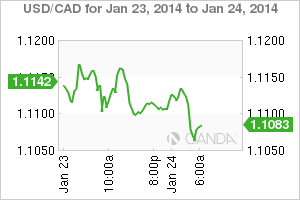 USD/CAD" title="USD/CAD" align="bottom" border="0" height="200" width="300">
USD/CAD" title="USD/CAD" align="bottom" border="0" height="200" width="300">
Many expect fiscal policy to be less of an impediment to U.S. growth in 2014. If so, it should allow the Federal Reserve to carefully navigate away from making asset purchases and reduce a token’s worth of its bond-buying program next week. Last year, the forex asset class managed to loiter within a contrived trading range policed by various central bank policies that, at times, led to a drop in both currency volume and volatility for painfully long stretches. This year, with global rates set to diverge, it should provide more volatility and with it more forex trading opportunities.
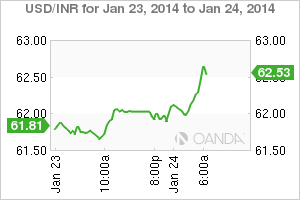 USD/INR" title="USD/INR" align="bottom" border="0" height="200" width="300">
USD/INR" title="USD/INR" align="bottom" border="0" height="200" width="300">
For instance, India's central bank needs to tame consumer-price inflation before it impedes economic growth. Brazilian job growth is the slowest it has been in 10 years, even with a FIFA World Cup and an Olympic Games to stage; both events create their own problems. Recently, Turkey's central bank had to intervene in the forex market to halt the free-fall of its currency, the TRY, against the dollar and the EUR. The IMF has been vocal and critical of Turkey’s actions. In the past, Turkey has adhered to a flexible exchange rate mechanism, which has served them well. Lagarde and company insist that they should stick to this modus operandi and focus more on taming inflation. The IMF believes an immediate increase in Turkish interest rates is the elixir needed to tame that country’s rampant inflation.
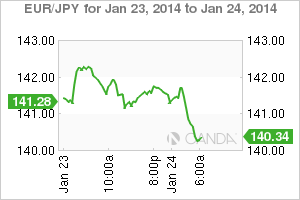 EUR/JPY" title="EUR/JPY" align="bottom" border="0" height="200" width="300">
EUR/JPY" title="EUR/JPY" align="bottom" border="0" height="200" width="300">
Central Bank Problems Piling Up
Follow the developing central banks. They are under extreme pressure to get things right and to avoid falling further afoul of inflation, growth, and unemployment. With heightened rate differential brings more trading opportunities. Yesterday saw a hive of black-box activity with an unusual five-carry trade: dealers and investors were buying JPY and EUR (selling USD) and U.S. 10-year note futures, while selling S&P E-minis and buying gold – clearly risk aversion is the order of the day.
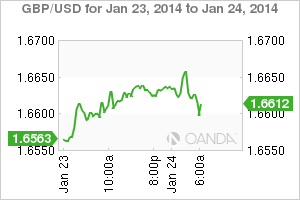 GBP/USD" title="GBP/USD" align="bottom" border="0" height="200" width="300">
GBP/USD" title="GBP/USD" align="bottom" border="0" height="200" width="300">
The central banks of developed economies have their own problems to wrestle. ECB President, Mario Draghi, remains upbeat but cautious. He continues to indicate there are "some encouraging signs" for the Eurozone, however, risks do remain. He says that inflation expectations are anchored and that risk for both "inflation and deflation are limited" – certainly some partially bullish words for the EUR. In contrast, Bank of England (BoE) Governor, Mark Carney, has some explaining to do. What happens to the BoE's forward guidance now that unemployment has fallen to 7.1%? At 7%, investors were led to believe that rates could rise. The Fed is facing a similar problem. With benign inflation, the IMF warned central banks not to be too hasty to hike rates lest it stifles whatever growth they have managed to claw back.